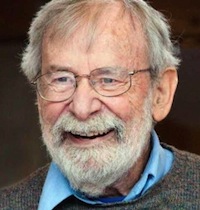Urban planning pioneer Kaufman remembered
Jerry Kaufman liked to joke that he didn’t see a tree until he was 16. And yet the man who grew up in an apartment in Queens, New York, went on to become a huge advocate for the land he so cherished, teaching urban planning for more than 30 years at UW–Madison.

Kaufman
Kaufman died Thursday, Jan. 10, at the age of 79 after a long battle with cancer. Friends and family gathered Monday for his funeral, remembering his legacy of helping others.
“He had a lot of commitment to his community,” says Ariel Kaufman, his daughter, who teaches in the School of Human Ecology. “Even though he was a planner, he was not just about planning. He was about doing.”
Kaufman taught from 1971 to 2001 in the Department of Urban and Regional Planning and was known for his work both as a teacher and as a researcher.
Kaufman worked extensively on food system planning, planning approaches and strategies, ethics, alternative dispute resolution, and urban and metropolitan policy in the United States and Europe. He received the Distinguished Service Award from the Association of Collegiate Schools of Planning in 1999 and was inducted as a fellow for the American Institute of Certified Planners in 2000.
Kaufman helped develop the Troy Gardens community project in Madison. He retired UW in 2001 and from 2000 to 2012 was president of Growing Power, a Milwaukee-based grassroots organization led by visionary urban famer Will Allen. The organization continues to help people grow and eat healthy food in impoverished areas of Milwaukee, Chicago and other cities.
Kaufman attended Queens College while living at home and later studied with urban planner Lewis Mumford at the University of Pennsylvania.
While Ariel Kaufman knew her father had long had an impact on those around him, that’s been made even more evident in his last days, as friends, family and colleagues said goodbye to him.
“I’ve just been floored by the outpouring,” Ariel says. “It’s incredible. He would hope people continue to do this work.”
While he had his share of awards, it was never about that to him. It was about making an impact, connecting people with issues and working on solutions.
“Even though he was a planner, he was not just about planning. He was about doing.”
Ariel Kaufman
Harry Webne-Behrman, a training officer with the UW–Madison Office of Human Resources, knew Kaufman for years through the university and also sings in the Madison Yiddish Choir, which Kaufman and his wife, Judith, established.
Whatever project he was working on, Webne-Behrman says, Kaufman thought of how it affected others.
“He stood up for people’s voices that tended not to be heard,” Webne-Behrman says. “It was always important for him throughout his life.”
Marcia Caton Campbell first met Kaufman when she interviewed for a job at UW–Madison. She remembers him asking, “Do you ever think about the food system?”
It was a conversation that continued after she got the job as an assistant professor in the Department of Urban and Regional Planning. She now is the Milwaukee director of the Center for Resilient Cities. Caton Campbell worked together again with Kaufman as part of Growing Power Madison. Access to food was something Kaufman thought about a lot and worked toward, she says.
“Jerry’s approach to things was very common sense,” Caton Campbell says. “He had big ideas, absolutely, but was also very pragmatic about how he was going to transform the world.”
He didn’t just love talking about food. He loved eating, especially the meals at Growing Power conferences and board meetings.
“His enthusiasm and enjoying for food was really something,” Caton Campbell says.
Caton Campbell says Kaufman was always curious, something he encouraged in others.
“I learned more about asking good questions from Jerry than I have from anyone else,” she says. “He taught me to be open to the answers you might find and not prejudge. Really asking thoughtful, provocative questions was a hallmark of what he did.”




